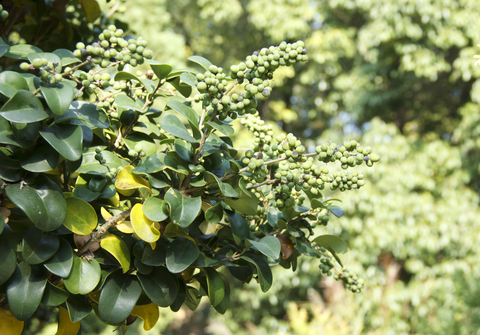Guggul Tree Resin
Also known as Commiphora mukul, Guggulipid, Indian Bedellium, and Guggulow
Introduction
Guggul, the Commiphora mukul, is a small thorny tree that is native to the Middle East and the Indian plains. Generally leafless, the tree exudes a thick, sticky resin that has been used in Ayurvedic medicine for centuries to treat arthritis, acne, inflammation, obesity and 'blood fat'. Guggul, whose Sanskrit name means "one that protects against diseases", has written historical information about it going back to 1000 B.C.E. It was used at that time for "clearing the coating and obstruction of channels". It was also used for healing bone fractures, inflammation, arthritis, cardiovascular conditions, obesity and lipid disorders. Research published in 1966 in India done on guggul gum concluded that it had positive effects on disorders involving lipid metabolism and had an intrinsic ability to help lower serum cholesterol. As of 1988 it has been available on the market in India as a hypolipidemic agent. Guggulipids and guggulsterones derived from the resinous gum are the most widely used medications for treating high cholesterol in India, where most research has been done on guggul. The gum exuded by the guggul tree is similar to myrrh, and has been used traditionally in the same ways as myrrh.
Constituents
Guggulipids, guggulsterones, Myrrhanol A
Parts Used
Gum resin.
Typical Preparations
Encapsulated, in liquid extract form and seldom in tea.
Summary
Guggul gum seems to be living up to its traditional medicinal uses. Studies in India have shown that guggulsterones stimulate the thyroid gland, which may be the explanation for its ability to reduce cholesterol and aid in weight loss. Those studies have shown that guggulsterone is at least as effective in improving the cholesterol profile as the leading pharmaceutical prescriptions. Preparations made with guggul gum also are as effective at reducing inflammation and relieving pain as ibuprofen, and as effective at fighting infection as tetracycline in treating acne. Other research has shown that myrrhanol A, a triterpene isolated from guggul gum, is a potent anti-inflammatory, and significantly reduces pain and stiffness in patients with osteoarthritis.
Precautions
Guggul gum is rated GRAS (generally regarded as safe) by the FDA, however those who have irritable bowel syndrome or liver conditions should avoid using guggul gum. Recent studies suggest that guggul gum should be used cautiously by those taking other prescription drugs, particularly statins used to lower cholesterol, and should not be taken with St. John's wort or acetaminophen. Not to be used while pregnant.
This statement not evaluated by the FDA. This product is not intended to diagnose, treat, cure, or prevent any disease.
This information courtesy of MOUNTAIN ROSE HERBS, with full, written permission for reuse.







